Part of the Comparative law and justice Wikiversity Project
| Subject classification: this is a comparative law and justice resource. |
<Daniella05 02:07, 19 March 2011 (UTC)>
Basic Information
.gif)
Bolivia is a vibrant country located in South America. Bolivia gained its Independence in 1825 after a rebellion, which was led by Simon Bolivar, who later gave his name to the country. Bolivia is one of the least developed countries in South America. Almost 2⁄3rds of the population live in poverty.
Geographical Demographics
Bolivia is located in the central part of South America. It has an area of 424,164,000 square miles. The bordering country's of Bolivia are Argentina, 832 km, Brazil, 3,400 km, Chile 861 km, Paraguay 750 km, and Peru at 900 km. The country of Bolivia is surrounded by land on all sides. The worlds highest navigable lake which is Lake Titicaca is shared with Peru. The land encompasses the beautiful Andes mountain range, the high altitude Altiplano plateau, the highlands, and the surrounding lower Amazon region. [1]
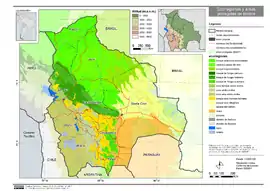
People
Bolivia's population is 9,947,418 inhabitants as of July of 2010. The Age structure is as follows:
- 0-14 years: 35.5%. Males 1,767,310 / Females 1,701,744.
- 15-64 years: 60%. Males 2,877,605 / Females 2,992,043.
- 65 + years: 4.5%. Males 193,196 / Females 243,348 [2]
As far as language is concerned Spanish is the number one language widely spoken as 60% of the population speak Spanish. There are various indigenous groups were a variety of languages are spoken, they are as follows: Quecha 21.2 % and Aymara 14.6 % [3]
Ethnic Groups
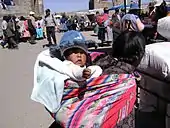
The major ethnic groups in Bolivia are the Aymara and Quechua who are about (2 million), the Chiquitano (180,000) and Guaraní (125,000) these are of the four largest of Bolivia's nearly 30 indigenous ethnic groups. The great majority of European descendants are of Spanish origin, although fairly large German, North American and Italian communities exist as well. There are also smaller Asian, Middle Eastern, Japanese, Chinese, Korean, Jewish, Mennonite, Swiss, Dutch and other minority groups. Many of these families settled in Bolivia several generations ago. Bolivia also has a small Afro-Bolivian group who reside in the Yungas region, this group are descendants of the few slaves brought from Africa. [4]
Religion
The predominant religion in Bolivia is Roman Catholic, whereas 95% of the population practice this religion, there is about a 5% ratio of persons who practice the Protestant (Evangelical Methodist) religion. [5]
Brief History
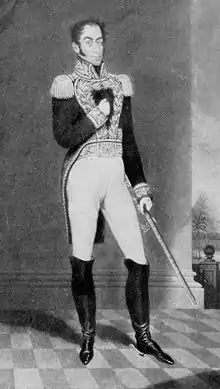
As we look at Bolivia's history dating back to the 1800's we see that modern Bolivia was once a part of the ancient Inca empire. "After the Spaniards defeated the Incas in the 16th century, Bolivia's predominantly Indian population was reduced to slavery. The remoteness of the Andes helped protect the Bolivian Indians from the European diseases that decimated other South American Indians. But the existence of a large indigenous group forced to live under the thumb of their colonizers created a stratified society of haves and have-not that continues to this day. Income inequality between the largely impoverished Indians who make up two-thirds of the country and the light-skinned European elite remains vast." [6]
"The country won its independence in 1825 and was named after Simón Bolívar, the famous liberator. Hampered by internal strife, Bolivia lost great slices of territory to three neighboring nations. Several thousand square miles and its outlet to the Pacific were taken by Chile after the War of the Pacific (1879–1884). In 1903, a piece of Bolivia's Acre Province, rich in rubber, was ceded to Brazil. And in 1938, after losing the Chaco War of 1932–1935 to Paraguay, Bolivia gave up its claim to nearly 100,000 sq mi of the Gran Chaco. Political instability ensued." [7]
"In 1965, Maj. Ernesto (Ché) Guevara began a revolutionary war. "With the aid of U.S. military advisers, the Bolivian army smashed the guerrilla movement, capturing and killing Guevara on Oct. 8, 1967. A string of military coups followed before the military returned the government to civilian rule in 1982, at that time Hernán Siles Zuazo became president. With his presidency, Bolivia had workers striking on a regular basis due to this the country had the lowest per capita income in South America".
"In June 1993, free-market advocate Gonzalo Sánchez de Lozada was elected president. He was succeeded by former general Hugo Bánzer, an ex-dictator turned democrat who became president for the second time in Aug. 1997. Bánzer made significant progress in wiping out illicit coca production and drug trafficking, which pleased the United States. However, the eradication of coca, a major crop in Bolivia since Incan times, plunged many Bolivian farmers into abject poverty. Although Bolivia sits on South America's second-largest natural gas reserves as well as considerable oil, the country has remained one of the poorest on the continent".
"In Aug. 2002, Gonzalo Sánchez de Lozada again became president, pledging to continue economic reforms and to create jobs. In Oct. 2003, Sánchez resigned after months of rioting and strikes over a gas-exporting project that protesters believed would benefit foreign companies more than Bolivians. His vice president, Carlos Mesa, replaced him. Despite continued unrest, Mesa remained popular during his first two years as president. In a July 2004 referendum on the future of the country's significant natural gas reserves (the second largest in South America), Bolivians overwhelmingly supported Mesa's plan to exert more control over foreign gas companies. Mesa managed to satisfy the strong anti privatization sentiment among Bolivians without shutting the door on some limited form of privatization in the future. But rising fuel prices in 2005 led to massive protests by tens of thousands of impoverished farmers and miners, and on June 6 Mesa resigned. Supreme court justice Eduardo Rodriguez took over as interim president".
"Bolivian Indian activist Evo Morales of the Movement Toward Socialism (MAS) won 54% of the vote in Dec. 2005 presidential elections, becoming the country's first indigenous president. He carried out two of his three major initiatives in 2006: nationalizing Bolivia's energy industry, which is expected to double the country's annual revenues; and forming in August a constituent assembly to rewrite the constitution, which will ensure greater rights for indigenous Bolivians. His third major initiative is to legalize the growing of coca, which many Bolivians consider an integral part of their culture. His controversial coca policy, his plans to limit foreign investment, and his close ties with the leftist governments of Venezuela and Cuba have predictably antagonized the United States. Morales has referred to himself as the “United States' biggest nightmare.”
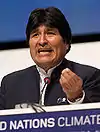
"On Dec. 9, 2007, Morales presented a new constitution to congress. The new chapter, which will give indigenous people more rights, recognize 37 official languages, and grant indigenous communities autonomy, was approved by 164 of the 255 constituent assembly members. The opposition boycotted the meeting, however, claiming that the document is illegal because it was not approved by the required two-thirds majority. Regardless of the opposition, the government plans to submit the document to a referendum in 2008".
On Aug. 10, 2008, President Morales won the vote on a recall winning with 63.5 percent of voters who were in full support of his administration. The recall vote was not successful, and the removal of Morales from office by his opponent Podemos, did not happen.
A new constitution that extended rights to all of the indigenous population who are the majority, was achieved also the new Constitution made way for the President to run for a second five-year term. These new rights were passed in a national referendum in January 2009.
In December, Morales was re-elected for a second term, taking more than 60% of the vote, well ahead of his conservative opponent." [8]
Economic Development, Health, and Education

The GDP of Bolivia is an estimated figure of $17.5 billion. (as of 2009) "Annual growth rate: 3.7%, and the Per capita income: $1,767. The Natural resources: Hydrocarbons (natural gas, petroleum); minerals (14.24% of GDP--zinc, silver, lead, gold, and iron). Agriculture (10.44% of GDP): Major products--Soybeans, cotton, potatoes, corn, sugarcane, rice, wheat, coffee, beef, barley, and quinoa. Arable land--27%. Manufacturing (11.17% of GDP): Types--food and beverages, textiles, wood. Transportation and communications: 8.41% of GDP. Public administration services: 10.44% of GDP. Trade: Exports--$5.3 billion (2009 est.). Major export products--natural gas, tin, zinc, coffee, silver, wood, gold, jewelry, soybeans, and soy products".[9]
The Life expectancy of the Bolivian people on a whole is 67.23 years of age, for males it is 64.52 years of age , and for females it is 70.07 years of age. The infant mortality rate is 43.41 deaths per year per 1000.00 live births. Bolivia's life expectancy is low compared to other countries that are more developed.[10]
Governance
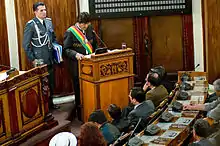
The country of Bolivia is a Republic Government. The country is now called the "Plurinational State of Bolivia"
The Branches of Government are made up of three branches which are the Executive Branch, Legislative Branch, and the Judicial Branch of the Government.
The Executive Branch
This branch is led by Juan Evo Morales, This branch of Government has lots of power, the president is the chief of state, and head of the Government. The Vice President is Alvaro Linera Garcia. The cabinet members in the Executive Branch are elected by the President. The elections of the president and vice president who are elected on the same ticket by popular vote for a single five-year term The last election was held on 6 December 2009 (next to be held in 2014); note - per the new constitution, presidents can serve for a total of two consecutive terms
The Legislative Branch
The National Congress of Bolivia consists of 27 senators, where 3 are elected per department (there are nine different areas within the country). They are elected by popular vote within each department. Within the Legislative Branch there is also a Chamber of deputies, where 130 seats are occupied. Of the seats 69 of them are elected by popular vote , and the remaining 61 seats are elected by proportional representation from party lists. They also serve 5 year terms.
The Judicial Branch
The Judicial Supreme Court the judges are elected by popular vote from list of candidates Pre-selected by Assembly for six-year terms); District Courts has one judge in each of the nine departments. For judicial review Bolivia has the Plurinational Constitutional Court where there are five primary judges and five alternate or "suplente" magistrates they are elected by popular vote from list of candidates Pre-selected by the Assembly as well for for six-year terms this court rules on all constitutional issues. The Plurinational Electoral Organ (seven members elected by the Assembly and the president, one member must be of indigenous origin to serve six-year terms. Agro-Environmental Court these judges are elected by popular vote from list of candidates preselected by the Assembly for once again six-year terms. Their main focus is on agro environmental issues. [11]
Bolivia's Constitution
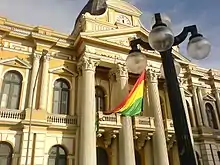
Bolivia's newest Constitution was rewritten in 2004 and finally passed in 2009. The President of Bolivia Evo Morales made significant changes that enabled more rights to indigenous groups. There was a 61 percent support of Morales new reformed Constitution, the majority of that support was from the western highlands where the country's indigenous majority has a vast population. Key reforms to the Constitution include:
- Re-election of the Presidency which mow allows Mr Morales to stand for re-election in Dec 2014.
- Indigenous rights to the majority of the population which focuses on the sacredness of ethnicity in Bolivia's land and a whole chapter is now devoted devoted to indigenous rights
- Autonomy: Power decentralized in acquiring 4 levels of autonomy, which are departmental, regional, municipal and indigenous.
- Resources: State now has control over economic sectors, also over vast natural gas fields.
- Indigenous systems of justice same status as official existing system. Judges will be elected, and no longer appointed by Congress.
- Land: There is now a new limit on ownership which allows 5,000 hectares (12,355) [12]
Voting
The voting age in Bolivia is 18 years of age for married people and 21 years of age for single people. Voting in Bolivia is universal and mandatory! [13]
Legislation
In order for Laws to be made there is a Legislative process that must be followed. The bill or bills must pass through The Chamber of Deputies and the Senate. The President then must sign the bill into Law. The President may also veto the bill. This veto may be overridden by a vote of 2/3rds of Congress.[14]
Judicial Review
The disorganized system of judicial review ended between 1995 and 1998. The was a new judicial power created called the Constitutional Tribunal (CT). This new concentrated form of judicial review introduced three profound changes. "First: The Constitutional Tribunal had stronger powers to assess legislation, administrative acts, and inter‐branch conflicts (Law 1836).7 Second: The decisions of the magistrados were not limited to the parties in the process, as in the diffuse system, but they prevailed erga omnes. Third: The Court had both preventive and corrective powers of judicial review, whereas previously the Supreme Court had none of those capacities since it was not possible to annul a law that a judge found to be unconstitutional".[15]
Criminal Law System
There was a new criminal procedure code enacted in 1999, was set in stone in 2001, its roots are inspired by the Civil Law Tradition. The new code introduces new structures that are like the common law tradition, such as jury trials and oral arguments. Bolivia recognized the need to reform the outdated judicial system. The new criminal procedure now adapted the role of the oral argument, from the common law tradition and introduced it in criminal court proceedings. This change implements the inquisitorial system into somewhat more of an aquestorial system. Now judges do not have the power to decide cases, in Criminal Courts. Lawyers and the prosecution take more of an independent role.[16]
Courts, Civil and Criminal Law
Courts and Civil Law
The Bolivian Court system consists of the Upper and Lower levels of courts. The highest court is the Supreme Court of Justice. The Supreme Court consists of a President and eleven judges called ministros. The different chambers of the Court hear cases on civil, penal,social and administrative matters. Justices (ministros) are elected for a term of ten years. The primary responsibility of the Supreme Court of Bolivia is hearing matters on the Constitutionality of Laws. The Senate elects members to become part of the Superior District Court, whose members are elected for a term of six years. The Superior District Court hears civil and criminal appeals sent up from the lower courts. The juegos de partido are lower court, sectional, and investigating judges, who are elected for four year terms. They are located in the cities and towns, of each of the nine departments. The investigating judges investigate and prepare cases for the sectional judges who try the cases. The lowest courts of the judicial system are the mayors' courts, where the local judges are employed. This is where most civil cases are heard, many of which pertain to hearing small claims. [17] Although direct damages are available (e.g. lost profits), punitive damages are not regulated. [18]
Criminal Law
The Constitution of Bolivia, written in 2009, protects the presumption of innocence for criminal defendants. The Constitution also protects the accused from having to self incriminate. Please see articles below taken directly from the Constitution.
"Article 116. I. It guarantees the presumption of innocence. During the process, if in doubt about the applicable standard, governed most favorable to the accused or defendant." [19]
"Article 121. I. In criminal matters, no person shall be compelled to testify against himself or against blood relatives within the fourth degree or by affinity to the second degree. The right to remain silent will not be considered as evidence of guilt." [20]
Punishment
As far as incarceration rates are concerned, according to the World Factbook Bolivia has 7,710 people in jail. For every 100,000.00 persons in Bolivia 83 of them are in prison.[21]
"Conditions in Bolivian jails are substandard, except for some drug traffickers and terrorists, who pay for and receive special treatment. Poorer Bolivians endure overcrowding, malnutrition, unsanitary conditions, and drug and alcohol abuse in their cell blocks. Most prisoners must pay for their cells. A prisoner who cannot pay the minimal amount necessary to secure the smallest cell must become, as a practical matter, indentured to a prisoner who owns a cell. In the poorest parts of the San Pedro prison in LaPaz, prisoners are housed in cells (3 by 4 by 6 feet) with no ventilation, lighting, or beds (gunny sacks are used as substitutes)."
"The food budget amounts to $0.25 a day per prisoner. Malnutrition is commonplace, and prisoners must supplement their diet any way they can: if their families do not regularly bring food, they may work in the prison factory or sell drugs, alcohol, or other contraband. By law, children up to 6 years old may live in prison if the incarcerated parent so desires. Government authorities have sought to get children out of the prisons, but many are still there because they have nowhere else to go. There are several prison deaths every year related to malnutrition and poor medical care. In May all 1,400 inmates at San Pedro prison in La Paz staged a hunger strike to protest prison conditions, the lack of day passes, and the delay in bringing cases to trial."[22]
In Bolivia Capital Punishment does not exist for all crimes. This was abolished in 1997. The last execution was carried out in Bolivia in 1974.[23]
In Bolivia Corporal punishment is lawful in the home. Article 276 of the Criminal Code states:“No aggression will be punished if the victim of the aggression is not seriously hurt and the aggressor is husband or wife, parent or grandparent, child or grandchild, sibling, close relative, political sibling, and if they are living Together."
Corporal Punishment is also not allowed in schools.
Corporal punishment is unlawful as a sentence for crimes. It is not a permitted sanction under the Criminal Code, the Juvenile Code (1992) or the Law on the Public Ministry (2001). However, sentences of corporal punishment are traditionally ordered by community elders in indigenous justice systems. The Constitution establishes Bolivia as a “Plurinacional Republic” and allows the indigenous peoples their right to self-determination.[24]
Law Enforcement
I believe that Bolivia would be considered a Multiple Coordinated Police System, due to the fact that the Police Units in the country are indirectly run by the government.
The law enforcements structure begins with the highest position and commandeer in charge being the President of the Country Evo Morales. Second in Command is the Minister of Government Sacha Lorentti Soliz.
The Next person in charge would be the General Commander, Ciro O. Farfane Marcilla, followed by the sub General Commander Jorge R. Santesteban Claure, next in Line is the Inspector General Oscar Munoz Colodro. These are the highest levels of command in the Bolivian Law Enforcement.[25]
There are different departments and special units within the Bolivian Police. They are as Follows: [26]
- F.E.L.L.C.- this department specializes in the fight against Organized Crime.
- F.E.L.C.N.- this department specializes in the fight against drug trafficking.
- C.O.A.-Bolivia- this department specializes in the control of customs and Immigration.
- Diprove-Bolivia-this department is a special unit that investigates the major problem of the Stealing of autos and auto parts.
- Radio Patrullas- this is the department that is located in all 9 departments, which is the largest group of the Bolivian Police Department. This is the department that patrols the neighborhoods in all areas, you would reach them by dialing 110.
- PAC- which operates in all departments as a Community Police Unit.
- Transito- which is the department that controls the transit in all of the country.
- Patrullla Carretera- this department is the highway patrol division of the Bolivian Police.
- Brigada de Protecion Familiar- this department is a special unit that handles all domestic cases.
To become a police officer in Bolivia it is a process just like we have here in the United States. The requirements to apply to the academy are as follows:[27]
- One has to show proof that they are a born a Bolivian National.
- One must be between 18-22 years of age.
- One must supply a notarized document stating that they can take part in medical, clinical, laboratory and psychological tests.
- A candidate must also submit a background check, that they have never had a criminal record.
- Also one must submit 4 pictures 4x4 in size of their full body with an olive green background.
When all this is done candidates are selected to enter the Police Academy (UNIPOL)
Family of Law
Bolivia's Legal System is based on Spanish and old Napoleonoc Code.
Bolivia is also a part of the Civil Law Tradition. [28]
This type of law focuses on a rational and universal legal system. (from my notes)
Crime Rates and Public Opinion
Bolivia is a country with a medium to high crime rate. The typical crimes that are done in a high quantity are pickpocketing,car theft, assaults and burglary's. Bolivia also tends to have a lot of problems with illicit drugs, as they are the 3rd largest nation to grow the cocoa plant. This results in illegal drug trafficking of cocaine and many Bolivian's do participate in the illegal drug trade.[29]
According to the United Nations Homocide Statistics on Intentional Homicides per 100,000, since 2008 Bolivia had an average of 10.6 homicides.[30]
Family Law
The Legal age in Bolivia is 21 years of age, for most things including marriage. Most men are allowed to get married at 16 years of age and woman as early as 14 years of age, if they have parental consent. Exceptions for parental or guardians consent would be minors minors who are pregnant and orphans. The only type of marriage that is legal in Bolivia is a Civil marriage, which is usually performed after a church ceremony. The mentally ill are not allowed to marry. A woman who is a widower, divorced or has her marriage anulled, may not re-marry for at least 300 days after a spouses death, or a divorce is settled.[31]
Protection of the Bolivian female in a family setting needs lots of improvement. There are many gender stereotypes still exsisting in Bolivia. There is no exact information is available about parental authority and custody rights in Bolivia.
In Bolivia women and men have equal inheritance rights.[32]
SECTION VII RIGHTS OF ELDERLY ADULTS
"Article 67. I. In addition to the rights recognized in this Constitution, every person of adult age has the right to a dignified old age that has quality and human warmth"
II. "The State shall provide an old age pension within the framework of full social security, in accordance with the law.
Article 68. I. "The State shall adopt public policies for the protection, attention, recreation, rest and social occupation of elderly adults, in accordance with their capacities and possibilities".
Bolivia has become part of the Convention of the rights of children
Juveniles in Bolivia have many rights. One of the major rights that has recently been focused on is the Bolivians youths right to an education.
Human Rights
In Bolivia the fundamental rights for each person that are protected by the legal system are as follows:
Respect for the Integrity of the Person, Including Freedom From:
a. Arbitrary or Unlawful Deprivation of Life
b. Disappearance
c. Torture or any other type of degrading cruel or inhumane punishment
d. Arbitrary arrests or detention
e. Denial of a fair public trial
f. Arbitrary Interference with Privacy, Family, Home, or Correspondence
Although the law prohibits discrimination based on ones race, gender, language, sexual orientation, or social status,
The persons who were mostly affected by discrimination,and experienced the most discrimination, are as follows in order are
woman, indigenous people, and the small black minority. Persons with HIV/AIDS, indigenous people, peasant farmers, and homosexuals.
Woman are treated unequal to men in Bolivia, as by law they are considered to be of an equal status many do not know their legal rights. Woman suffer severe to the crimes of rape and domestic violence, as they occur at high rates. The violence of woman is not taken very serious in Bolivia. The special units of family protection are understaffed due to lack of economical support from the government. I would say that woman are treated with major inequality issues and are at the top of the lists for being denied their basic human rights.
Children are next on the lists when it comes to human rights issues. Many children are homeless, and live in detention centers. Children's basic human rights are abused astronomically as corporal punishment, child prostitution,human trafficking, and child labor are all major problems in Bolivia.
Persons with disabilities are not widely accepted in the society as a whole in Bolivia.
Racism is a major problem as the Afro-Bolivian minority, who do not seem to progress in Bolivia, tend to remain at the lowest scale of the socioeconomic status. This is based on wide spread racism against this minority. This minority encounters severe disadvantages in health, life expectancy, education, income, literacy, and employment.
As far as discrimination is concerned, a study conducted by the country showed 80 percent of homosexuals were discriminated against in the workforce, 70 percent in the educational system, and 60 percent in health centers.
The human rights ombudsman reported that persons living with HIV/AIDS disease were the ones who faced the highest degree of discrimination in the country .[33]
Works Cited
- ↑ Learn Spanish (no date) Bolivia Information and facts( Website accessed on 11 April 2011) Retrieved from http://www.learn-spanish-help.com/bolivia.html Bolivia.Information&facts
- ↑ CIA The World Factbook (Feb 2011) Bolivia People (Website accessed on 2/11/11) Retrieved from https://www.cia.gov/library/publications/the-world-factbook/geos/bl.html World Factbook Bolivia
- ↑ CIA The World Factbook (Feb 2011) Bolivia Languages(Website accessed on 2/11/11)Retrieved from World Factbook-Bolivia
- ↑ Bolivia Bella (copyright 2007-2011) Population of Bolivia and Demographics(Website accessed on 2/11/11)Retrieved from http://www.boliviabella.com/population.html Population of Bolivia and Demographics
- ↑ CIA World Factbook (Feb 2011) Bolivia Religion(Website accessed on 2/11/11)Retrieved from https://www.cia.gov/library/publications/the-world-factbook/geos/bl.html The World Factbook Religions
- ↑ Info Please (copyright 2005) Bolivia History (assessed on 2/11/11) Retrieved from http://www.infoplease.com/ipa/A0107345"Bolivia:History,Geography,Goverment and Culture"
- ↑ Info Please (copyright 2005) Bolivia History (assessed on 2/11/11) Retrieved from http://www.infoplease.com/ipa/A0107345."Bolivia:History, Geography ,Government and Culture"
- ↑ Info Please (copyright 2005) Bolivia History (assessed on 2/11/11) Retrieved from"Bolivia:History, Geography, Government and Culture"
- ↑ Us Department of State (2009)Bolivia Economy(Assessed on 2/11/11) Retreived from[http:/"/www.state.gov/r/pa/ei/bgn/35751.htm"
- ↑ CIA The World Factbook(Feb 2011) Bolivia People (Assessed on 2/11/11) Retrieved from https://www."cia.gov/library/publications/the-world-factbook/geos/bl.html"
- ↑ CIA The World Factbook(Feb 2011) Bolivia Government (Assessed on 3/4/11) Retrieved from https://www."cia.gov/library/publications/the-world-factbook/geos/bl.html"
- ↑ BBC World News (March 2011)Bolivia Country Profile (Assessed on March 4,2011) Retrieved from http://news.bbc.co.uk/2/hi/americas/country_profiles/1210487.stm#facts
- ↑ The Titi Tuderancea Bulletin (October 13, 2010) Voting Age Bolivia (Website accessed on March 4,2010) Retrieved from http://www.tititudorancea.com/z/voting_age.htm
- ↑ Country Studies (1989)Bolivia-The Legislature (Website accessed on 2 May 2011) Retrieved from http://countrystudies.us/bolivia/74.htm
- ↑ Anibal Perez Linan and Andrea Castignola,University Of Pittsburgh Editors,(no date) Bolivia, The Rise and Fall of Judicial Review (Website accessed on 3/4/11) Retrieved from http://www.juecesypoliticaenamericalatina.cide.edu/papers/castagnola.pdf
- ↑ Judicial Reform of Criminal Justice in Latin America (no date)Bolivia (Website accessed on 3/3/2011) Retrieved from www.oas.org/legal/english/osla/judicial_reform.doc
- ↑ Rex A. Hudson and Dennis M. Hanratty, editors. (1989). Bolivia: A Country Study. Retrieved from http://countrystudies.us/bolivia/75.htm.
- ↑ Latin American Corporate Counsel Association. (2011). Bolivia. (24 March 2011). Retrieved from http://www.laccanet.com/reference/topics/60/jurisdictions/99/bolivia/.
- ↑ Political Database of the Americas. (2009). Republic of Bolivia Constitution. (24 March 2011). Retrieved from http://pdba.georgetown.edu/Constitutions/Bolivia/bolivia09.html.
- ↑ Political Database of the Americas. (2009). Republic of Bolivia Constitution.(24 March 2011). Retrieved from http://pdba.georgetown.edu/Constitutions/Bolivia/bolivia09.html.
- ↑ CIA The World Factbook.(2007).Prison Population and Incarceration Rates-2007.(Website accessed on 1 April 2011) Retrieved from http://www.allcountries.org/ranks/prison_incarceration_rates_of_countries_2007.html1
- ↑ United States Department of State, (January 30, 1994) U.S. Department of State Country Report on Human Rights Practices 1993 -Bolivia, (Website accessed on 1 April 2011) Retrieved from: http://www.unhcr.org/refworld/docid/3ae6aa4b2c.html
- ↑ Amnesty International. (2009)Death Penalty: Countries Abolitionist for Ordinary Crimes Only( Website accessed on April 1, 2011) Retrieved from http://www.amnesty.org/en/death-penalty/countries-abolitionist-for-ordinary-crimes-only
- ↑ Bolivia (February 2011)Current Legality of Corporal Punishment.(website accessed on 1 April 2011) Retrieved from http://www.endcorporalpunishment.org/pages/progress/reports/bolivia.html#Lawfulness
- ↑ Policia Boliviana Sirviendo La Communidad March 2011 Mando Institutional (Website accessed on March 11, 2011) Retrieved from http://www.policia.bo/mando.php
- ↑ Policia Boliviano (March 2011) Unidades Operacionales (Website accessed on March 11, 2011) Retrieved from http://www.policia.bo/index.php
- ↑ Unipol (2011) Unipol Requisitos (Website accessed on March 11, 2011) Retrieved from http://www.unipol.edu.bo/home/index.php?option=com_content&task=view&id=28&Itemid=44
- ↑ Juri Globe World Legal Systems Research Group (no date) Bolivia (Website accessed on April 8, 2011) Retrieved from http://www.juriglobe.ca/eng/sys-juri/index-alpha.php#BOLIVIA
- ↑ Nation Master (2011) South America- Bolivia Crimes (Website accessed on February 18, 2011) Retrieved from http://www.nationmaster.com/country/bl-bolivia/cri-crime"
- ↑ UNODOC (2003-2008) Bolivia (Website accessed on February 18, 2011) Retrieved from http://www.unodc.org/unodc/en/data-and-analysis/homicide.html
- ↑ United States Embassy La Paz Bolivia (17 May 2007) Bolivian Marriage Laws (Website accessed on April 7, 2011) Retrieved from http://www.megalink.com/usemblapaz/english/consular/greencard.htm 7
- ↑ SIGI Social Institutions and Gender Index Family Code Bolivia (Website accessed on April 7, 2011) Retrieved from http://genderindex.org/country/bolivia
- ↑ US Department of State (2008) Human Rights Report Bolivia (Website accessed on April 15, 2011) Retrieved from (http://www.state.gov/g/drl/rls/hrrpt/2008/wha/119149.htm Assessed on 4/15/11